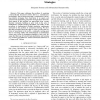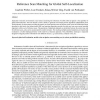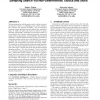57 search results - page 10 / 12 » Independent navigation of multiple robots and virtual agents |
ICRA
2010
IEEE
13 years 6 months ago
2010
IEEE
— This paper addresses the problem of acquiring a hierarchically structured robotic skill in a nonstationary environment. This is achieved through a combination of learning primi...
RAS
2002
13 years 7 months ago
2002
Especially in dynamic environments a key feature concerning the robustness of mobile robot navigation is the capability of global self-localization. This term denotes a robot'...
SECON
2010
IEEE
13 years 5 months ago
2010
IEEE
Existing solutions to carrier-based sensor placement by a single robot, in a bounded unknown region of interest (ROI), do not guarantee full area coverage and/or do not terminate. ...
ATAL
2009
Springer
13 years 8 months ago
2009
Springer
Motion planning for mobile agents, such as robots, acting in the physical world is a challenging task, which traditionally concerns safe obstacle avoidance. We are interested in p...
AAAI
2007
13 years 9 months ago
2007
Often remote investigations use autonomous agents to observe an environment on behalf of absent scientists. Predictive exploration improves these systems’ efficiency with onboa...



